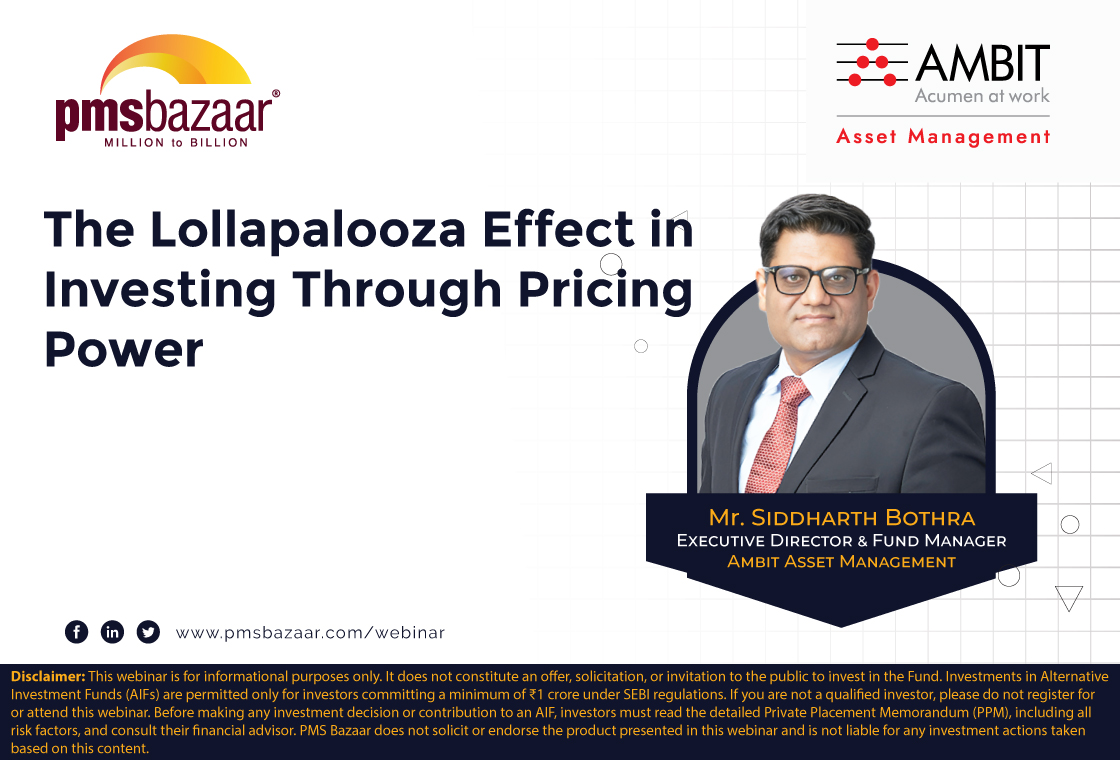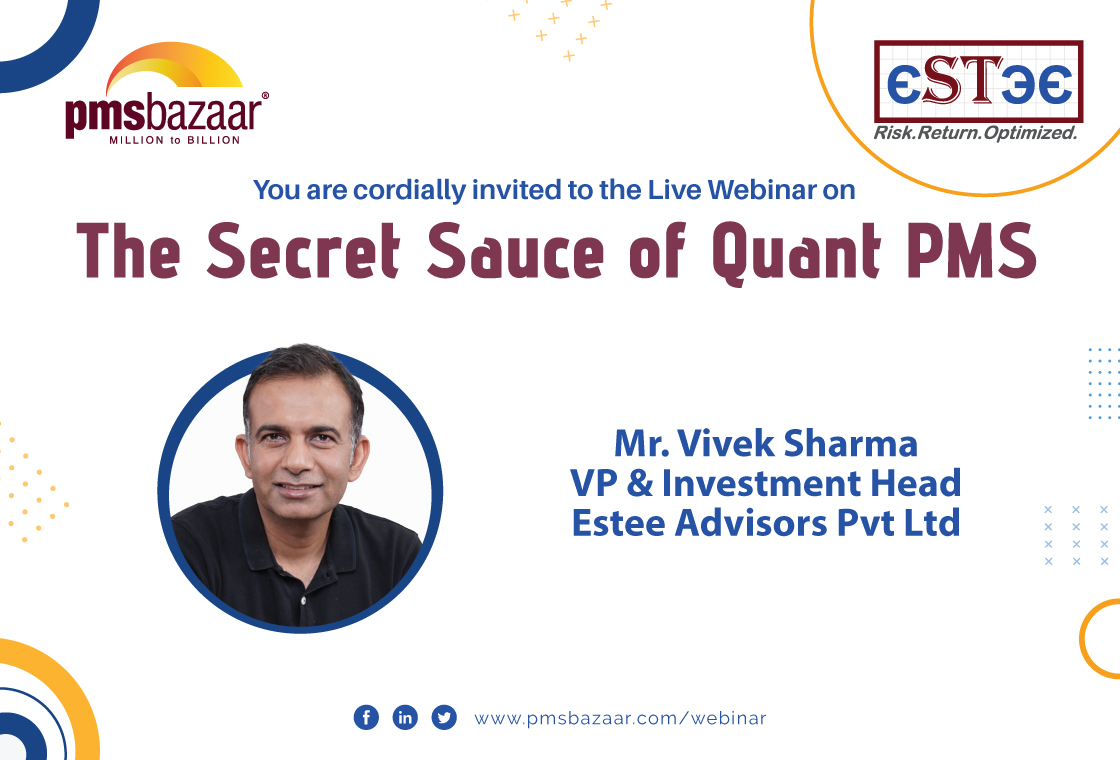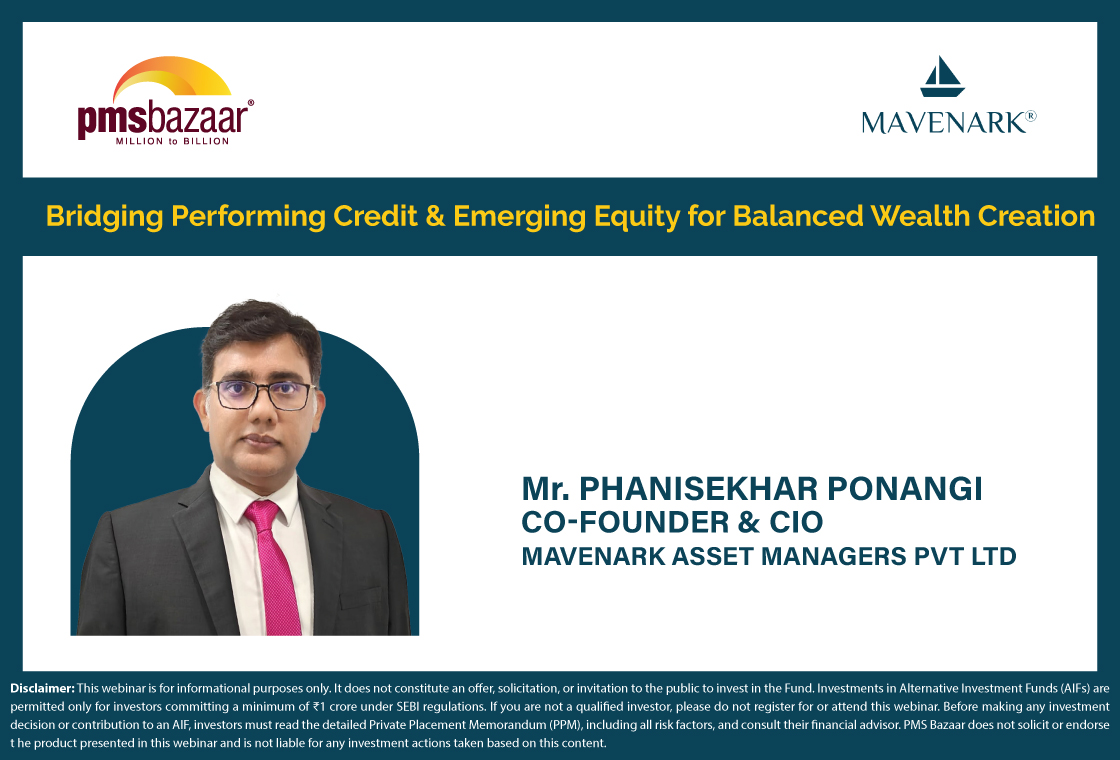PMS Bazaar recently conducted a Quarterly Update Interview Series, where Fund Managers shared their performance of the quarter and outlook on the market. This Blog covers excerpts of our Exclusive Interview with Mr. Surjitt Singh Arora, Portfolio Manager & Principal Officer - PMS, PGIM India, sharing his insights and performance for the first quarter of FY23-24.

Excerpts from the interview
As a subsidiary of Prudential USA, the 11th largest asset management in the world, PGIM India Portfolio Management Services (PMS) manages a substantial net asset worth over USD 2.8 billion. With a decade of experience under its belt, the company's flagship portfolio, PGIM India Core Equity Portfolio, has made its mark in the industry with impressive returns and a unique investment philosophy.
Investment Selection
Mr. Surjitt stated, "Since its inception in July 2013, PGIM India PMS has grown into a seasoned player in the investment landscape. The company has crafted its strategies based on a Growth at Reasonable Price (GARP) philosophy, an approach that has proved to be a winning formula for its clients. This approach emphasizes the importance of identifying companies with potential growth prospects and reasonable valuations. The GARP framework allows the company to strike the perfect balance between growth and value, ensuring optimal returns for its investors.”
How GARP Works
As Explained by Mr. Surjitt, the guiding principles of their GARP (Growth at Reasonable Price) framework are as follows -
Stock Selection: PGIM employs the Price to Earnings Growth (PEG) ratio to identify suitable stocks. A PEG ratio below 1.6 indicates reasonable valuations and qualifies a company for potential investment. Stocks with PEG ratios above 3 are considered overvalued, prompting the company to take profit-booking measures.
Risk Mitigation: Managing risk is paramount in any investment endeavor. PGIM mitigates risk by limiting individual stock weightage to 10% and sectoral exposure to 30%. This prudent approach ensures a diversified and balanced portfolio, safeguarding against excessive exposure to any particular stock or sector.
The Investment Universe:
According to Mr. Surjitt, PGIM India rigorously filters the investment universe using four key parameters:
• Scalability in Revenue: Companies with a proven track record of scaling their revenue are given preference.
• 15+ Years of Existence: The minimum age of a company should be 15 years, indicating stability and endurance.
• Positive Cash Flow: Companies that consistently generate positive free cash flow over seven out of ten years are favored.
• Higher Return on Capital (ROC): Depending on the sector, a higher ROC is sought to ensure sustainable profitability.
How to Choose Quality Companies
When discussing a good quality company, the primary criteria include having a substantial scale in terms of revenue. Furthermore, the company should have experienced and successfully navigated through a downturn cycle, resulting in its emergence as a robust and resilient entity. Additionally, consistency in terms of cash flow is a vital characteristic. Moreover, the Return on Capital Employed (ROC) profile over the past decade serves as an essential indicator of its financial performance and efficiency. These factors collectively contribute to identifying a company with high-quality attributes.
Several factors beyond the mentioned criteria determine a company's overall quality. A competent and forward-thinking management team, a focus on innovation and R&D, solid corporate governance, and a sustainable competitive advantage are crucial. Social and environmental responsibility, prudent debt management, and transparent practices also play significant roles in fostering trust and attracting investors and consumers. Reputable companies invest in growth, adapt to changing markets, and allocate resources effectively, ensuring long-term sustainability and success.
Risk Mitigation
According to Mr. Surjitt, ‘The risk mitigation approach at PGM India focuses on diversification, careful allocation, and constant monitoring of the portfolio. By not allowing individual stock weightage to exceed 10%, they reduce the impact of adverse movements in any stock on the overall portfolio. This ensures that a significant downturn in one stock doesn't disproportionately affect the entire investment. Similarly, the limit on sectoral exposure to 30% prevents over-concentration in a specific industry. This way, if a particular sector faces challenges, the overall impact on the portfolio is limited. It also guards against potential sector-specific risks or economic fluctuations affecting the entire investment strategy.”
Maintaining valuations within comfort zones is critical in preventing emotional decision-making during market fluctuations. By adhering to predetermined criteria, the investment team remains disciplined and avoids the temptation to chase excessively high valuations.
Moreover, constant monitoring of portfolio holdings and market conditions allows for proactive risk management. If a stock's performance becomes overly dominant, steps are taken to rebalance the portfolio. This active approach ensures the portfolio remains aligned with the investment strategy and risk tolerance.
Highlights on Industrial Sector - PLI Scheme
The Government of India has taken a significant step towards promoting domestic manufacturing and attracting investments by introducing the Production Linked Incentive (PLI) scheme. This ambitious initiative aims to boost the country's manufacturing sector by providing financial incentives to eligible companies.
Under the PLI scheme, the government has allocated over USD 32 billion to encourage large-scale production in strategic sectors such as electronics, pharmaceuticals, automobiles, textiles, etc. The scheme offers companies a time-bound, performance-based incentive linked directly to their incremental sales from domestically manufactured products.
By offering such incentives, the government aims to enhance India's competitiveness in the global market, reduce import dependence, create job opportunities, and foster innovation. It is a part of the broader vision to transform India into a manufacturing hub and realize the "Make in India" initiative.
The PLI scheme has garnered significant interest from domestic and international companies, attracting substantial investments across various industries. It serves as a powerful tool to incentivize companies to expand their manufacturing capabilities within the country, ultimately contributing to economic growth and development.
Mr. Surjitt Singh Arora discussed several other questions in detail during the interview. Watch the Interview session with the link appended below -
Get access to rich data and analytics of PMS & AIF by subscribing to us. Join the 50000+ investors & experts now: Subscribe NOW
Recent Blogs

Dynamic Investing Approach in Different Markets
This article is authored by Rishabh Nahar, partner and fund manager, Qode Advisors LLP

The Accreditation Edge: Unlocking the Power of Accredited Investors to make Diversified Investments
PMS Bazaar recently organized a webinar titled “The Accreditation Edge: Unlocking the Power of Accredited Investors to make Diversified Investments,” which featured Mr. Archit Lohia, Founder and CEO of Career Topper Online Education Pvt. Ltd. This blog covers the important points shared in this insightful webinar.

PMS performance hit by broad market slump in July; Thematic strategies buck the trend
Of 427 equity PMSes, only 61 gained; Debt offerings showed positive returns. July 2025 proved to be a testing month for Portfolio Management Services (PMS) investors, with broad-based declines across most asset classes.

July tests AIF resilience; Long-short strategies lead relative gains game
Only 44 of 137 AIFs ended positive; long-only funds averaged –1.15%, while long-short peers limited losses to –0.29%

The Lollapalooza Effect in Investing Through Pricing Power
PMS Bazaar recently organized a webinar titled “The Lollapalooza Effect in Investing Through Pricing Power” which featured Mr. Siddharth Bothra, Executive Director and Fund Manager, Ambit Asset Management. This blog covers the important points shared in this insightful webinar.

The Secret Sauce of Quant PMS
PMS Bazaar recently organized a webinar titled “The Secret Sauce of Quant PMS,” which featured Mr. Vivek Sharma, VP & Investment Head, Estee Advisors Private Limited.

Bridging Performing Credit and Emerging Equity for Balanced Wealth Creation
PMS Bazaar recently organized a webinar titled “Bridging Performing Credit and Emerging Equity for Balanced Wealth Creation,” which featured Mr. Phanisekhar Ponangi, Co-Founder and CIO, MavenArk Asset Managers Pvt Limited. This blog covers the important points shared in this insightful webinar.

Equity PMS performance steady in June; over 99% in green as rally broadens
Best schemes log 10-19% gains, but the overall extent of outperformance vs. benchmarks was lower compared to May

